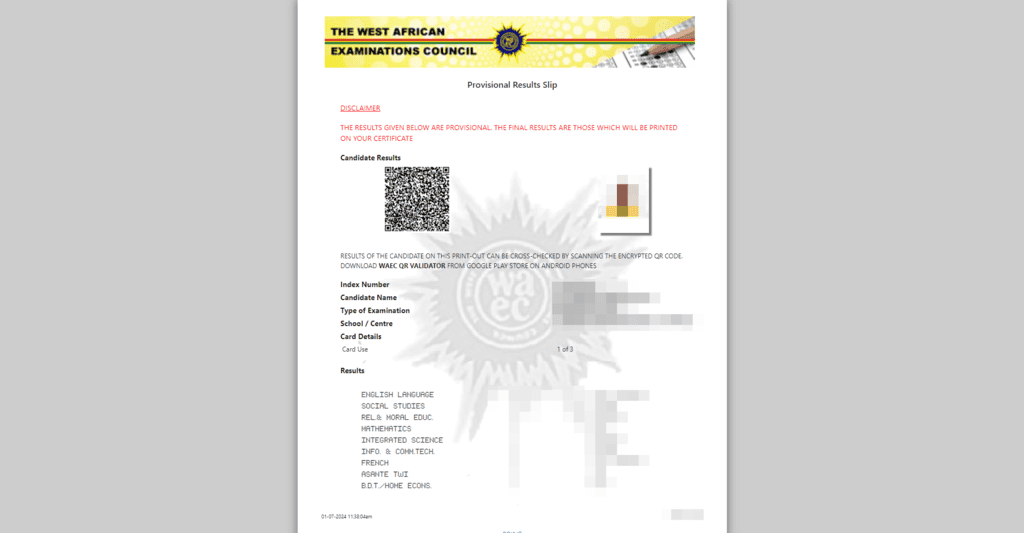Key takeaways
- The BECE uses a nine-point grading scale, with 1 being the highest and 9 the lowest.
- The aggregate score is the sum of the grades of your core and two elective/optional subjects.
- The BECE aggregate score determines your school placement and other opportunities like scholarships.
The Basic Education Certificate Examination (BECE) is the final exam for Junior High School students in Ghana. Passing the exam allows you to further your education in a public senior high school or vocational institution. In this guide, we show you how to calculate your aggregate score from your results.
How is the BECE graded?
The BECE grading system uses numbers to grade candidates based on their total scores. It’s a nine-point scale, where grades 1 is the highest and 9 is the lowest. For each subject, the final score is composed of 70% from the external examination (the BECE) and 30% from continuous assessment.
Grades 1–3 show that you have a perfect understanding of the subject, while grades 4–6 mean a reasonable and fair understanding. Grades 7–9 show that a student has a developing understanding of the subject, which is not necessarily a failure.
How to calculate your BECE results?
Now that you understand the grades on your BECE results let’s calculate your aggregate score. The BECE aggregate score is the sum of your grades in core subjects and your best two grades in elective subjects, making a total of six grades.
The core subjects include English Language, Mathematics, General Science, and Social Studies, with English and Math carrying significant weight.
Elective subjects are Religious and Moral Education, Career Technology, Creative Arts & Design, and Ghanaian Language, while optional subjects such as French, Arabic, and Computing are considered only if you wrote them.
Example BECE aggregate calculation

Let’s say Ernest Boadi is your friend who wrote the BECE and got the following results:
- English Language: 2
- Social Studies: 5
- Religious and Moral Education: 2
- Mathematics: 3
- Integrated Science: 4
- Career Technology: 3
- French: 5
- Asante Twi
- Creative Arts & Design: 2
To calculate his BECE aggregate score, we’ll pick his core subjects (English Language: 2, Social Studies: 5, Mathematics: 3, and Integrated Science: 4). The sum is: 2 + 5 + 3 + 4 = 14
We’ll also add his best two grades from the elective subjects (Religious and Moral Education: 2 and Creative Arts & Design: 2). That is: 2 + 2 = 4
Finally, to get the total aggregate score, we’ll add the core and elective grades. In this example, Ernest Boadi’s total BECE aggregate score will be 14 + 4, which is 18.
Quick tip: For a quick and accurate assessment, you can use our BECE aggregate score calculator to easily determine your top six results.
Why your BECE aggregate score is important
In the Ghana education system, your BECE aggregate score matters a lot. Besides showing that you have a good understanding of the subjects you studied, here are three other reasons why you must learn hard to get a better aggregate:
- School placement: Your aggregate score determines your placement into Senior High Schools (SHS) and technical institutes.
- Scholarship opportunities: High scores can open up opportunities for scholarships, reducing the financial burden of further education.
- Future opportunities: Your BECE aggregate score impacts your academic and influences the opportunities available to you.
Note: Ghana Education Service (GES) uses a Computerised School Selection and Placement System (CSSPS) to place junior high school students based on their aggregate and total raw scores in the best six subjects.
FAQs
What is a good aggregate score in BECE?
A good aggregate score in BECE is anything between 6 and 18. Aim for higher aggregate scores to increase your chances of gaining admission to a preferred senior high school, technical, or vocational institute.
What is the BECE aggregate cut-off to get a school placement?
The BECE aggregate cut-off point for school placement is 30. However, it depends on demand and available space in different senior high schools. In competitive academic years, cut-off points can be lower, while in less competitive years, they may be higher.
What is the highest raw score in BECE?
The highest raw score you can achieve in BECE is 600, which is a sum of perfect scores (marks) in your core subjects and the best two elective subjects. However, the specific raw score to pass a subject can change from year to year based on the difficulty of the exams and the performance of other candidates.
Summary
Understanding how to calculate your BECE aggregate score is important if you want to be placed in senior high schools. To summarise, you must add your core and two best elective subjects to get your BECE aggregate score.
We hope that by mastering this calculation, you can confidently determine your aggregate score from your BECE results. If you have any questions from the steps above, we’ll be happy to help.











86 Comments. Leave new
Can a person with aggregate 18,persue general art in prempeh college
Aggregate 18 makes it tough to get General Arts at Prempeh since the competition is very high. But you can still get another good school to do General Arts.
Please I got Aggregate 15, will I be admitted into St. Peters shs,nkwatia offering or with Agriculture? Please I want to know before 17 September
Aggregate 15 gives you a good chance, but St. Peter’s is very competitive. If there are enough slots for Agriculture, you could get in.
Aunty, please I got an aggregate 16. Can I pursue General Science in Achimota?
Aggregate 16 is a good grade, but getting General Science at Achimota will be tough because of how competitive the School and the course you chose is. You may need a lower aggregate for that, but you’ll still qualify for other strong schools and programmes. 🙂
If I get aggregate 12 will I get adisadel college I am going to offer business
With aggregate 12, there’s a chance you can get Adisadel for Business, but it won’t be easy since the school is very competitive. If not, you’ll still get placed in another strong school.
Please I wrote BECE this year if you get aggrgate 20 and you choose Notre dame as your first choice will you get it
Aggregate 20 can still get you placed, but Notre Dame is very competitive. If there are spaces left in the course you chose, you stand a chance. If not, you’ll be placed in another good school.
I was hearing news regarding this years total aggregate calculation. I saw some sources suggesting that its now 3 core and 3 elective instead of the usual 4 core and 2 electives. Since this article was written last year i would like to ask if there has been an official change to the system
Hello Kofi, there hasn’t been a change to the system.
Many blogs confuse the WASSCE aggregate calculation, which uses three cores and three electives, for the BECE aggregate calculation.
The BECE uses all four core subjects and two best electives. You’ll see this under “3.0 PLACEMENT” in this official document from GES.
Please I heard that this year’s grading includes career Technology and r.m.e as part of their core subject please can you try and confirm that for me?
Hello William, this is not true, there has been no communication from WAEC/GES indicating this.
Please I am writing the BECE this year, what aggregate should I aim for because I want to choose either Mfantsipm or St. Augustine as my first choice and there is only one month left and I’m still not confident that I can do well even though I’m learning so how can I prepare
If you want to attend Mfantsipim or St. Augustine’s, you should aim for an aggregate between 6 and 9 to have a strong chance.
With one month left, we’ll also recommend focusing on your core subjects English, Math, Science, and Social Studies and practicing as many past BECE questions as you can. Create a study timetable, spend extra time on the subjects you find difficult, and ask for help when you need it.
A lot can improve in one month if you stay serious and focused. 🙂
Thank you
Please what about if choose Ghanass and my final results if I gained this aggregate which are
English 3
RME 4
Maths 3
Career tech 1
Creative Art 1
Science 2
Computing 4
Ghanian language 3
Social studies 3
Can I get my first choice which is Ghanass
Your results look strong, Hendrix, so you stand a good chance of getting Ghanass as your first choice. But remember, placement also depends on the programme you pick and whether there are spaces available for that course.
Oh ¥es
Please if an individual get Aggregate 13 and the person choosesAccra Academy as his first choice wanting to pursue Agriculture will the person get it
Yes, Andreas. That’s possible.
Plz, is 80 – 100 grade 1 or 90 – 100?
90–100 is grade 1 in the BECE.
Please Which schools can my ward get at the SHS level after scoring aggregate 18 in the 2024 BECE. He wants to read Visual Arts at Achimota Senior High School as his first choice.His grades are: Mathematics-4
English 2
General Science 5
Social Studies 2
Computing 2
Creative Arts and design 3
RME 4
Akuapem Twi 5
French 5
There are many other factors at play besides his final aggregate, please follow these steps to check his BECE school placement.
Can a student with overall score of 20 get his 2nd choice for general arts?
This will depend on the school you chose.
If someone got 12 and that choose St. Louis for her first choice also the people wants to persue General science. Please will it be possible
Yes, there’s a small chance.
Pls are you sure we are using this format
What if you got 12 then u got 4ones and your raw score is good to pass you can you get ur first choice school
Yes. Even then, your raw score is more important than your aggregate score during the school placement.
Madam pls iams this source from waec because when I heard it I was very happy I don’t want my happiness to turn into tears
Plz according to my calculations I had 25 but still don’t understand plz can u help me with this plz
Where are you confused or don’t understand?
What is your source for the new aggregate format? Kindly assist me.
WAEC explains the grading system in-depth in this video.
My son had aggregate 13 and selected kumasi Anglican snr.high to persue General science can he get the chance?
With aggregate 13, your son has a good chance at Kumasi Anglican for General Science. It will still depend on space and competition, but the grade is good.
Please I also had aggregate 16
Please I had 5 in science and want to pursue General Science at the SHS. Please can I get my first choice.
Grade 5 in Science can make it difficult to get your first choice school for General Science.
If a candidates science is withheld will he or she be placed
Science is a core subject and can affect your school placement.
Per the new curriculum is it not true that all subjects are core subjects except Computing and French. May I now the basis for which you arrived at some subjects being core and elective.
No, all subjects aren’t core subjects. There are mandatory, elective, and optional subjects for students writing the BECE. But it takes nothing away from the main cores and electives. Read more here.
Pls can aggregate 12 get their first choice if they chose science
It’s not impossible, but it can be difficult.
I want to know how to register as a private candidate and write the exam again.
Please speak to your teachers about this.
I till don’t understand when I used it it was demanding for four core why
You have to enter all your grades, the calculator would automatically choose your core and best two electives.
Maths:5
English:5
Rme:4 social:4
science:4
career TECH:6
computing:4
Asante two:5
Please use our BECE aggregate score calculator.
Why don’t the WAEC ponder to announce the new grading format to broadcasting news for every candidates, teachers and parents to hear and be aware? Because we are all oblivion about it.
WAEC explains the grading system in-depth in this video.
The video is for 2022, please
Yes, that was when the latest explanation was made. Nothing has changed since then.
Please I want to use the results calculator but it is not working not working
You just have to enter your grades for the various subjects and press “Calculate Aggregate.”
So pls will aggregate 41 get school,she chose day
There’s a small chance.
Please can you get grade 6 in science and pursue general science at shs?
Yes, that’s possible.
Pls the results came yesterday as I Checked and that was not what I was expecting the results was 15 but I was expecting more than that pls can you help me I beg you please 😭😭😭😭😭😭😭😭 because of that I couldn’t eat pls I the name of God please help me😭😭😭😭😭
Please speak to your teachers about this, Divine.
When will the school release
We’re unsure of that at the moment.
I am confused in calculating my sister’s grades….I don’t know whether we are using 3core and 3electives or 4core and 2electives
The new grading system uses core and two electives. Use our BECE aggregate score calculator.
Thanks for confirming
Can you calculate my child aggregate for me?
English 2
Maths 3
Social 3
Science 4
RME 2
Career Tech 1
Comp 4
French 4
Twi 4
Please use our BECE aggregate score calculator, it’s easier and faster.
Can some one with 1 in social studies 1 in english language 1 in math’s plus 3 ones in the elective subjects get aggregate 6 without getting 1 in sclence
Yes, that’s possible. You can use our BECE aggregate score calculator to check your final aggregate.
If this is how the aggregate is calculated,then we thank God
Please is this the new way of calculating the aggregate score? Because previously, they used the grades from the 4 core and best 2 from electives. If this is indeed the new way, will it be communicated to candidates generally to avoid making mistakes?
Yes, this is the new format.
My child creative art design is pending,pls am waiting for that to do my calculation
Sure, you can use our BECE aggregate score calculator to check the current aggregate in the mean time. It’s simple and faster.
If a candidate did well in say computing (an optional subject), will it be considered in calculating aggregate score?
Yes, optional subjects count towards your total aggregate score. You can use our BECE aggregate score calculator to calculate your total score.
How do we get the bece aggregate score calculator
You can access it here: BECE aggregate score calculator.
There’s a problem with it
What problem did you find with it, Nathan?